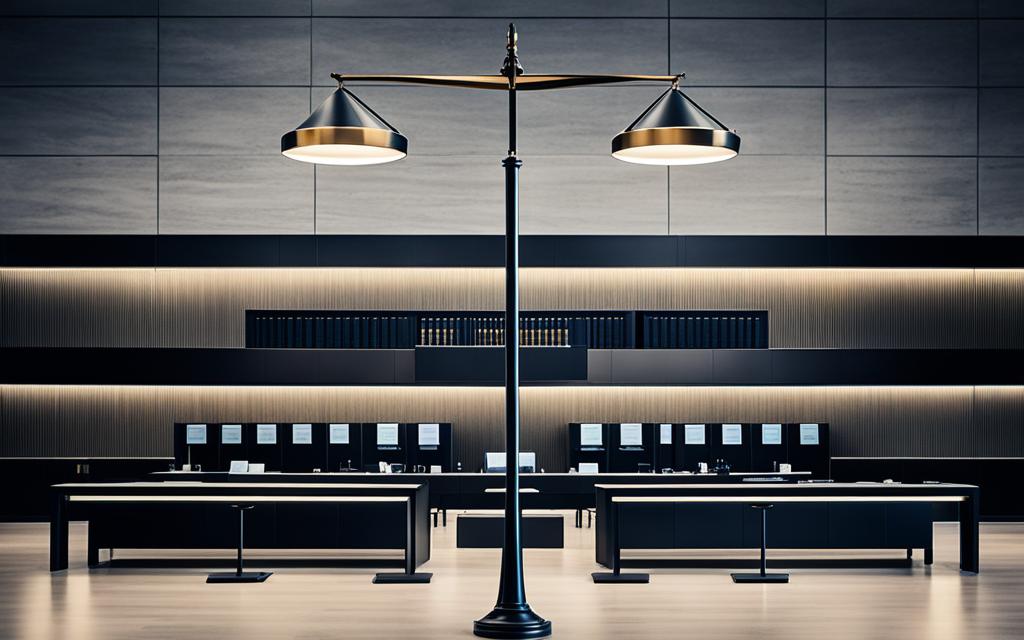Everyone faces the strong hand of the state, which can arrest, prosecute, and punish. It’s crucial this power is used carefully and with checks in place to defend the rights of the accused.1 Ensuring a fair trial means more than just protecting individual rights. It’s about making the criminal legal system and society fair, equal, and just for all.
At Fair Trials, our focus is to challenge overcriminalization, misuse of state power, and unfair imprisonment. We are determined to stamp out discrimination and bias found in criminal legal systems globally.1 Our goal is to stand up for the rights of those accused, ensuring they get a fair chance and due process throughout their legal journey.
Key Takeaways
- The state’s power to arrest, prosecute, and punish must be exercised with restraint and safeguards to protect the rights of the accused.
- Protecting the right to a fair trial is essential for ensuring a fair, equal, and just criminal legal system and society.
- Fair Trials opposes overcriminalization, the misuse of state power, and incarceration, and works to eliminate discrimination and bias in criminal legal systems.
- The presumption of innocence and the right to due process must be vigorously defended throughout the criminal justice process.
- High-end legal services can provide the expertise and resources necessary to protect your legal rights in criminal cases.
The Importance of Protecting Your Legal Rights in Criminal Cases
I know how vital it is to keep my legal rights safe in the complex world of criminal justice. This system has many procedures where the government brings charges against people. They often do this on behalf of all society, claiming a person has harmed everyone.2 Yet, it’s not forgotten that there are victims, and groups in the justice system work to help them too.1
Navigating the Criminal Justice System
It’s key to ensure a fair trial for everyone, because being found guilty has huge impacts. Not just on the person accused, but their family and the community as well.1 The state must show someone’s guilt clearly. Otherwise, they should be seen as innocent.1
The Consequences of Compromising Your Rights
The legal process needs to be fair and follow the rules, with courts that are neutral and apply the law equally.1 If the idea of being presumed innocent until proven guilty is ignored, it can lead to serious problems. For instance, it might result in the misuse of state power and discrimination within the system.1 To make sure justice is done without unnecessary waits, it’s critical for me to protect rights like having a trial quickly, having a lawyer, and the right to a fair process.23
Your Legal Rights in Criminal Cases
As a citizen, it’s really important to know your rights when you’re accused of a crime. The U.S. Constitution’s Bill of Rights is key here, protecting our basic rights in the criminal justice system.4 The Sixth Amendment specifically grants rights in criminal cases. These include knowing the charges against you, facing your accusers, and having a lawyer at your trial.4
The Right to Counsel
4 If you’re in a criminal case, you have the right to a lawyer at every step, even if you appeal. If you can’t pay for a lawyer, the state will provide one for you, for free.3 The government pays for these lawyers. This is true before sentencing, during the trial, and when making deals with prosecutors.
The Presumption of Innocence
4 The U.S. Constitution’s due process means you’re seen as innocent until proven guilty. You get to see all the evidence, know your court dates, and have a lawyer. It also protects you from being tried for the same crime twice.
The Right to Due Process
4 Miranda Rights let you stay silent when the police question you. And what you say can’t be used against you if it was forced. The Sixth Amendment ensures you have a right to a public trial. It also says you can have a jury of as few as six people in less serious cases.
In any criminal trial, all 12 jurors must agree to find you guilty. When they don’t, it’s called a “hung jury.”3 A judge also makes sure your trial happens quickly, unless there’s a good reason for delay.
3 Under the Fifth Amendment, you’re protected from being tried twice for the same crime.4 It’s not guaranteed you’ll win a case, but a good defense can really make a difference in the outcome.
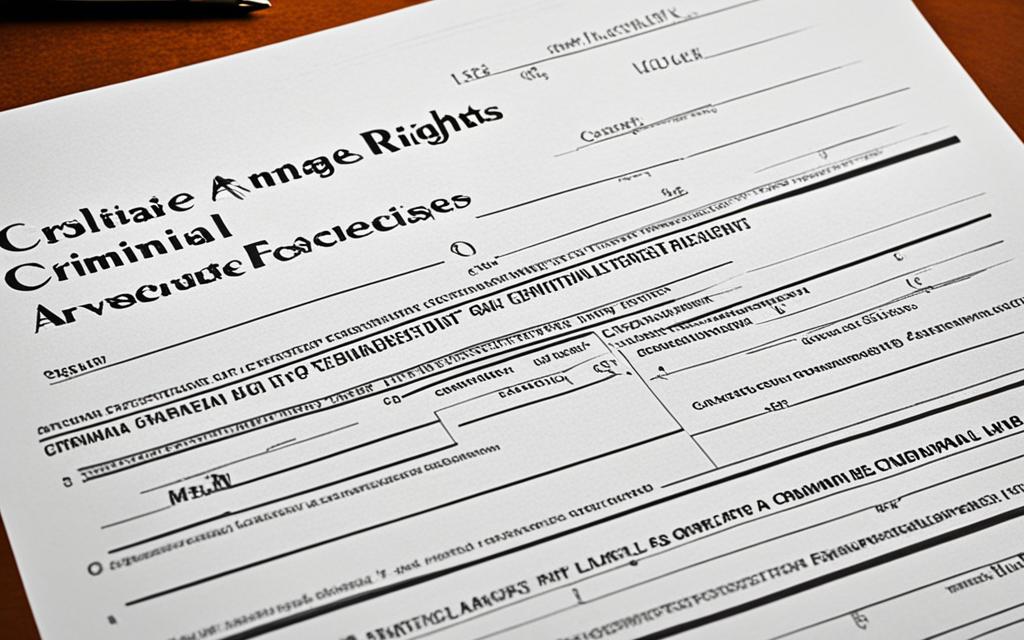
The Role of a Skilled Criminal Defense Attorney
Being a skilled criminal defense lawyer means protecting people’s rights and crafting a strong defense plan.5 I focus on ensuring my clients get a fair treatment, from the moment they are arrested to the end of their trial.
I work hard to make sure the justice system treats everyone fairly.5 My aim is to protect my clients’ rights and ensure their voices are heard in court.
Defending Your Constitutional Rights
Defending my clients’ rights is a key part of my job as a lawyer.5 I am fully dedicated to guaranteeing these rights are respected, preventing any misuse of state power. I stand up for fairness, equality, and justice for every client.
Building a Strong Defense Strategy
Creating a solid defense strategy is at the heart of what I do.6 This means collecting evidence, talking to witnesses, and studying the case’s details. It’s about knowing every fact inside out. I work with prosecutors, suggesting changes in plea deals or asking for lesser charges for my clients.5 By preparing thoroughly and tailoring my strategy for each case, I aim to achieve the best results for those I represent.
5 I spend a lot of time getting ready for trial, about 40% of my work.5 This dedication ensures I am ready to make a strong defense, question witnesses, and contest evidence against my clients in court.7 Nailing down the legal facts and exploring past cases further sharpens my ability to protect my clients’ rights.
7 Keeping my clients’ information private is vital for me.7 I always handle their information with the utmost care during the case process.
7 My job doesn’t stop at the trial. I also fight for my clients during pre-trial phases, like arraignments and bail hearings. This wide-ranging support is crucial in safeguarding my clients’ rights at all steps of their legal battle.
7 At the sentencing phase, I push for the best possible outcome for my clients by highlighting any positive aspects, like their efforts to reform. I aim for decisions that are in my clients’ favor and are just.
Understanding the Criminal Justice Process
It all starts when a crime is reported or found by law enforcers.8 Then, the suspect is caught and taken into custody. After that, they meet a judge or magistrate for the first time. Here, they find out the charges and if they should stay in jail.9
Arrest and Booking
The arrest and booking involve recording the suspect’s details and searching them.8 The suspect stays in custody until their first court appearance within 24 hours.9
Pretrial Proceedings
After the first appearance, there are more steps before the trial, like hearings and indictments.8 These steps decide on the evidence and if the accused is freed or secured. Crime victims might get help during this time, too.9
Trial and Sentencing
In court, the defendant can choose a jury trial and present a case.8 The jury then decides if they are guilty or innocent based on the facts.8 If found guilty, the judge sets the punishment.9
| Stage | Key Factors |
|---|---|
| Arrest and Booking |
– Suspect’s personal information recorded – Suspect searched and fingerprinted – Initial appearance before judge within 24 hours |
| Pretrial Proceedings |
– Preliminary hearings and grand jury indictments – Determination of sufficient evidence to proceed – Decisions on pre-trial release and bail – Victim compensation and support services |
| Trial and Sentencing |
– Right to jury trial and defense presentation – Jury determines guilt or innocence – Judge imposes sentence based on guidelines |
The justice system is detailed and covers many steps.8 Knowing these steps and your rights is very important. It ensures a just result for everyone involved.
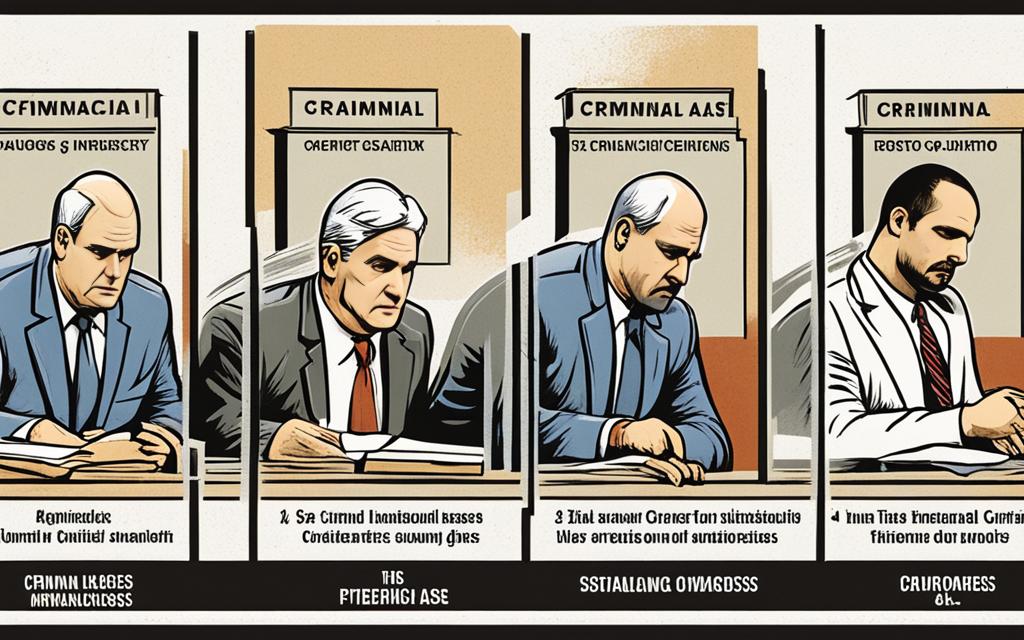
The Advantages of High-End Legal Services
If you’re faced with criminal charges, having the best legal team is crucial. A skilled criminal defense attorney, equipped with the latest tools, can greatly benefit you. These top-tier services provide custom support, helping you navigate the legal system’s complexities.10
Experienced and Dedicated Legal Representation
Elite criminal defense lawyers use their vast experience and deep legal knowledge to craft solid defense strategies.10 Unlike public defenders, private criminal defense lawyers often bring 15 years of experience to the table. They work with a closely-knit team, ensuring you get their full attention. This is opposed to public defenders who might have more cases and less time for each client.10
Cutting-Edge Resources and Technology
Access to a vast array of resources and the latest tech is a big advantage. Private attorneys can hire experts and investigators, improving the strength of your defense.10 Also, law firms with a national presence have more resources available for their clients’ defenses.11 These tools give criminal defense lawyers an upper hand in safeguarding your rights.
Common Criminal Charges and Defenses
The legal system sees different kinds of crimes, from big felonies to smaller misdemeanors. Felonies are the worst and can get you big punishments. This includes long prison times or even the death penalty. Misdemeanors are not as bad.
Felonies and Misdemeanors
When someone is accused of a crime, they might have ways to defend themselves. This could be through self-defense or by saying they were not thinking clearly, or didn’t mean to do harm. These defenses could help clear their name.1213
Affirmative Defenses
Also, talking between the prosecution and defense, known as plea bargaining, is very important. This can help lower the punishment or change the charges against the accused.12
Plea Bargaining and Negotiations
The prosecution needs to prove the crime without a doubt. If the police break the law when they find evidence, or don’t follow rights, the case might get thrown out. It’s hard to prove that a person was not in their right mind when they did the crime. If someone says they were somewhere else when the crime happened, they need to prove it.
If someone commits a crime by accident, because they didn’t know it was a crime, they might have a defense. If someone else forced them to do it, they can also say they didn’t really want to.
There is one more defense. It’s when a crime is done to prevent something worse from happening.
In a violent situation, using force to stop harm is allowed in certain cases. But, there are strict rules about when and how it can be done.
If someone did not understand they were doing something wrong because of a mental problem, it might change how the court sees the case. Expert doctors might need to talk about this.
The law also protects against how evidence is found, if lawyers aren’t fair, or if someone’s rights are not protected.
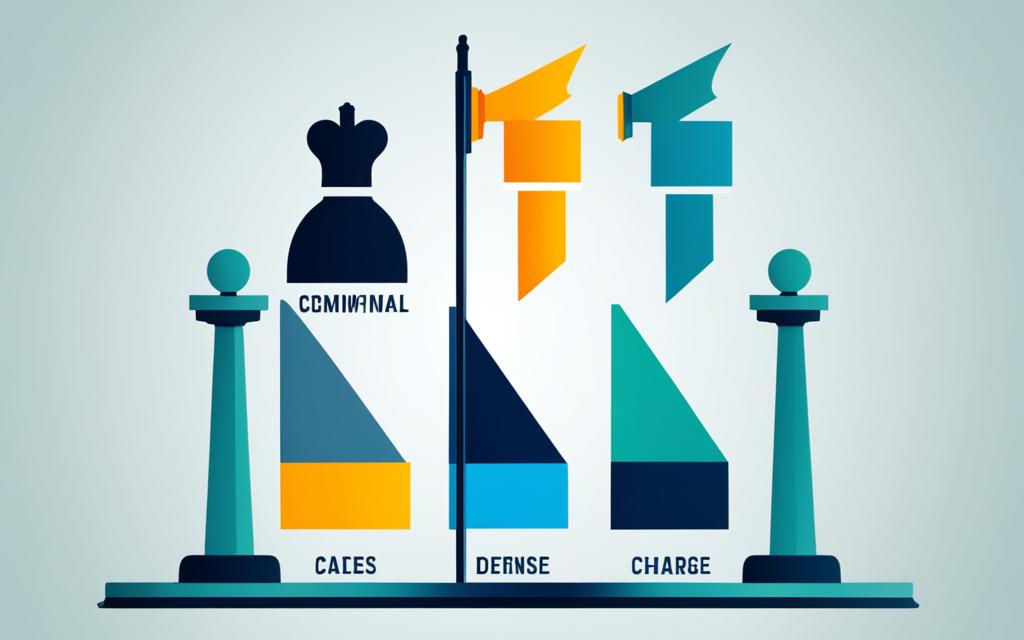
Protecting Your Rights at Every Stage
The criminal justice system protects people at all stages. This includes interrogations, interviews, and search procedures. The Fourth Amendment shields us from unreasonable searches and seizures. It says police must have a warrant to search, unless it’s urgent.14
Interrogation and Interviews
The Fifth Amendment lets you stay quiet during questioning. The Sixth Amendment states you can get a lawyer. If police don’t read you your rights (Miranda rights), your charges might drop. A good Michigan lawyer can get illegal evidence thrown out.14 The Miranda decision obliges cops to notify you of your rights, like staying silent and having a lawyer with you when they question you.14
Search and Seizure Procedures
The Fourth Amendment also stops unfair searches and seizures. Except in emergencies, officers need a warrant to search. If you’re in custody and not read your Miranda rights, a court might not accept what you said. Saying you want a lawyer should stop the questioning.14
It’s vital to know and use your rights to protect yourself in court. Top Michigan lawyers have a strong history of defending against illegal police actions. They strive to keep out any wrongly obtained info from your case.1514

The Impact of Criminal Convictions
A criminal conviction can change someone’s life in many ways. These changes often last long after the punishment is over.16They can make it hard to find a job, a place to live, or further your education. All of this can make your life more difficult.
Collateral Consequences
Being convicted of a crime, big or small, can stop you from fitting back into society.1617 It may lead to losing U.S. citizenship or getting deported if you’re on a temporary visa.17It can also make becoming a U.S. citizen tougher. Plus, you might not be able to get student loans. This could make going to college a lot harder.17 With some convictions, you might lose the right to own a gun or vote.17
Expungement and Record Sealing
Sometimes, you can get your record wiped clean. This is called expungement.16But, even if your record is expunged, some people can still see it. Judges and law enforcement can look up these records.16Deciding on things like expungement is tough. It’s why you’d want a good lawyer on your side. They can help make sure you get the best outcome possible.
Having a criminal record can really affect you for a long time. But knowing your rights and teaming up with an expert legal team can help.161718 They can guide you through the law and try to make the impact on your life smaller.
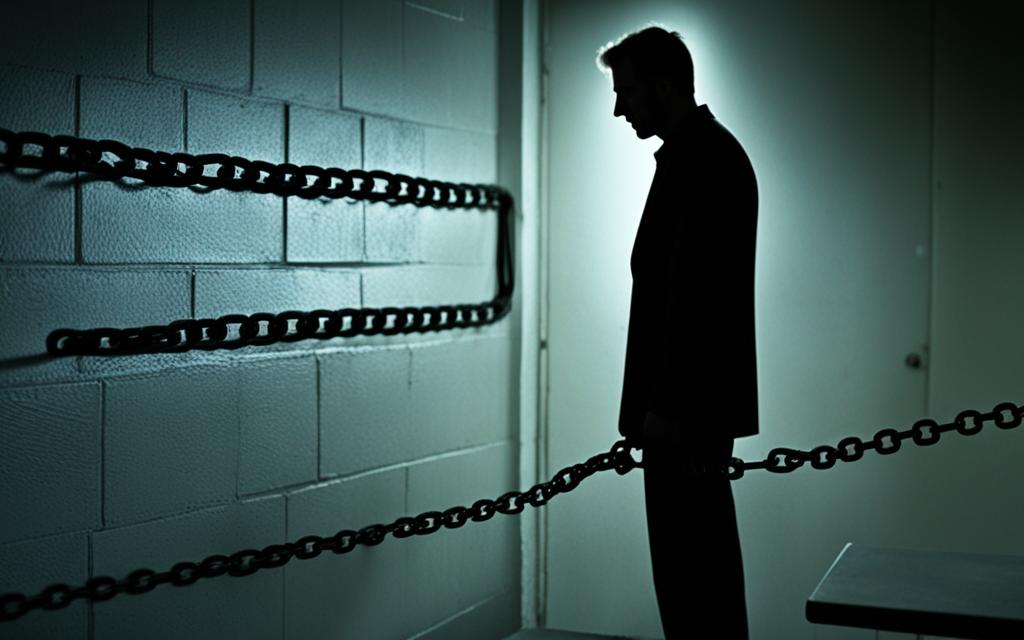
Conclusion
It’s crucial to protect your rights in criminal cases. This ensures fairness, given the state’s big power to charge and punish people.1 Knowing your rights and having a skilled legal team makes a huge difference. They help keep your rights safe and fight for you in court.1 This aims to make the system fair, equal, and just for everyone.
The process of criminal law is hard, with many steps and challenges.19 But, having the right legal help keeps things smooth. It helps you aim for the best outcome.1 To do this, it’s wise to stay informed and work closely with your defense lawyer. This gives you the best shot at a good result and lessens the impact of any charge or conviction.
In the end, safeguarding your rights in criminal cases is key. Great legal help can change everything.20 By knowing how the process works and your rights, you can take steps to protect yourself. A just and fair outcome is possible with the right actions.1 This not only helps you but keeps the legal system fair and honest too.
FAQ
What are the key components of the U.S. Constitution that impact the criminal justice system?
What is the role of a skilled criminal defense attorney?
What are the typical stages of the criminal justice process?
What are the benefits of hiring a skilled, experienced criminal defense attorney with access to high-end legal services?
What are the different types of criminal charges and the potential defenses available?
What are the key protections and rights individuals have during the criminal justice process?
What are the long-term consequences of a criminal conviction and how can they be mitigated?
Source Links
- https://www.fairtrials.org/the-right-to-a-fair-trial/
- https://www.criminalcourtnj.com/blog/the-right-to-a-speedy-trial-in-new-jersey-what-does-it-really-mean/
- https://www.nolo.com/legal-encyclopedia/defendants-rights-during-court-trial-29793.html
- https://www.savannahlawyers.com/article/your-rights-in-a-criminal-case/
- https://www.rogo-law.com/blog/2023/august/how-does-a-criminal-defense-attorney-help-you-/
- https://stowellcrayk.com/the-importance-of-having-a-skilled-criminal-defense-attorney-on-your-side/
- https://www.crowelllawoffices.com/the-role-of-a-defense-attorney-in-a-criminal-case/
- https://www.justice.gov/enrd/environmental-crime-victim-assistance/criminal-justice-process
- https://www.sao12.org/victims-rights/stages-in-the-justice-system
- https://www.criminalattorneycolumbus.com/benefits-hiring-private-counsel-vs-public-defender/
- https://www.lawfirm.com/criminal-defense/law-firm/
- https://kretzerfirm.com/common-legal-defenses-in-criminal-law-liability/
- https://federalcriminaldefense.pro/blog/what-are-the-four-major-criminal-law-defenses/
- https://www.grabellaw.com/miranda-rights.html
- https://www.michigan.gov/ag/initiatives/crime-victim-rights
- https://www.justcriminallaw.com/criminal-charges-questions/2024/04/04/how-will-a-prior-conviction-affect-your-criminal-case/
- https://www.gelmanlawfirm.com/blog/how-a-criminal-conviction-affects-your-life/
- https://patitucelaw.com/2024/04/impact-of-federal-crime-conviction-on-your-life-and-rights/
- https://www.justice.gov/usao-nj/victim-witness/handbook
- https://academic.oup.com/book/5705/chapter/148817745
